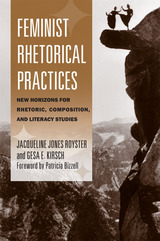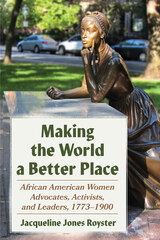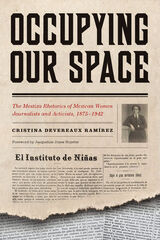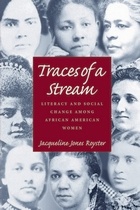
To contextualize a new and changed landscape for narratives in the history of rhetoric, Royster and Kirsch present four critical terms of engagement—critical imagination, strategic contemplation, social circulation, and globalization—as the foundation for a new analytical model for understanding, interpreting, and evaluating feminist rhetorical inquiry and the study and teaching of rhetoric in general. This model draws directly on the wealth of knowledge and understanding gained from feminist rhetorical practices, especially sensitivity toward meaningfully and respectfully rendering the work, lives, cultures, and traditions of historical and contemporary women in rhetorical scholarship.
Proposing ambitious new standards for viewing and valuing excellence in feminist rhetorical practice, Royster and Kirsch advocate an ethos of respect and humility in the analysis of communities and specific rhetorical performances neglected in rhetorical history, recasting rhetorical studies as a global phenomenon rather than a western one. They also reflect on their own personal and professional development as researchers as they highlight innovative feminist research over the past thirty years to articulate how feminist work is changing the field and pointing to the active participation of women in various discourse arenas and to the practices and genres they use.
Valuable to new and established scholars of rhetoric, Feminist Rhetorical Practice: New Horizons for Rhetoric, Composition, and Literacy Studies is essential for understanding the theoretical, methodological, and ethical impacts of feminist rhetorical studies on the wider field.
Winner, 2014 Winifred Bryan Horner Outstanding Book Award


Occupying Our Space sheds new light on the contributions of Mexican women journalists and writers during the late nineteenth and early twentieth centuries, marked as the zenith of Mexican journalism. Journalists played a significant role in transforming Mexican social and political life before and after the Revolution (1910–1920), and women were a part of this movement as publishers, writers, public speakers, and political activists. However, their contributions to the broad historical changes associated with the Revolution, as well as the pre- and post-revolutionary eras, are often excluded or overlooked.
This book fills a gap in feminine rhetorical history by providing an in-depth look at several important journalists who claimed rhetorical puestos, or public speaking spaces. The book closely examines the writings of Laureana Wright de Kleinhans (1842–1896), Juana Belén Gutiérrez de Mendoza (1875–1942), the political group Las mujeres de Zitácuaro (1900), Hermila Galindo (1896–1954), and others. Grounded in the overarching theoretical lens of mestiza rhetoric, Occupying Our Space considers the ways in which Mexican women journalists negotiated shifting feminine identities and the emerging national politics of the late nineteenth and early twentieth centuries. With full-length Spanish primary documents along with their translations, this scholarship reframes the conversation about the rhetorical and intellectual role women played in the ever-changing political and identity culture in Mexico.

Traces of a Stream offers a unique scholarly perspective that merges interests in rhetorical and literacy studies, United States social and political theory, and African American women writers. Focusing on elite nineteenth-century African American women who formed a new class of women well positioned to use language with consequence, Royster uses interdisciplinary perspectives (literature, history, feminist studies, African American studies, psychology, art, sociology, economics) to present a well-textured rhetorical analysis of the literate practices of these women. With a shift in educational opportunity after the Civil War, African American women gained access to higher education and received formal training in rhetoric and writing. By the end of the nineteenth-century, significant numbers of African American women operated actively in many public arenas.
In her study, Royster acknowledges the persistence of disempowering forces in the lives of African American women and their equal perseverance against these forces. Amid these conditions, Royster views the acquisition of literacy as a dynamic moment for African American women, not only in terms of their use of written language to satisfy their general needs for agency and authority, but also to fulfill socio-political purposes as well.
Traces of a Stream is a showcase for nineteenth-century African American women, and particularly elite women, as a group of writers who are currently underrepresented in rhetorical scholarship. Royster has formulated both an analytical theory and an ideological perspective that are useful in gaining a more generative understanding of literate practices as a whole and the practices of African American women in particular. Royster tells a tale of rhetorical prowess, calling for alternative ways of seeing, reading, and rendering scholarship as she seeks to establish a more suitable place for the contributions and achievements of African American women writers.
READERS
Browse our collection.
PUBLISHERS
See BiblioVault's publisher services.
STUDENT SERVICES
Files for college accessibility offices.
UChicago Accessibility Resources
home | accessibility | search | about | contact us
BiblioVault ® 2001 - 2024
The University of Chicago Press









